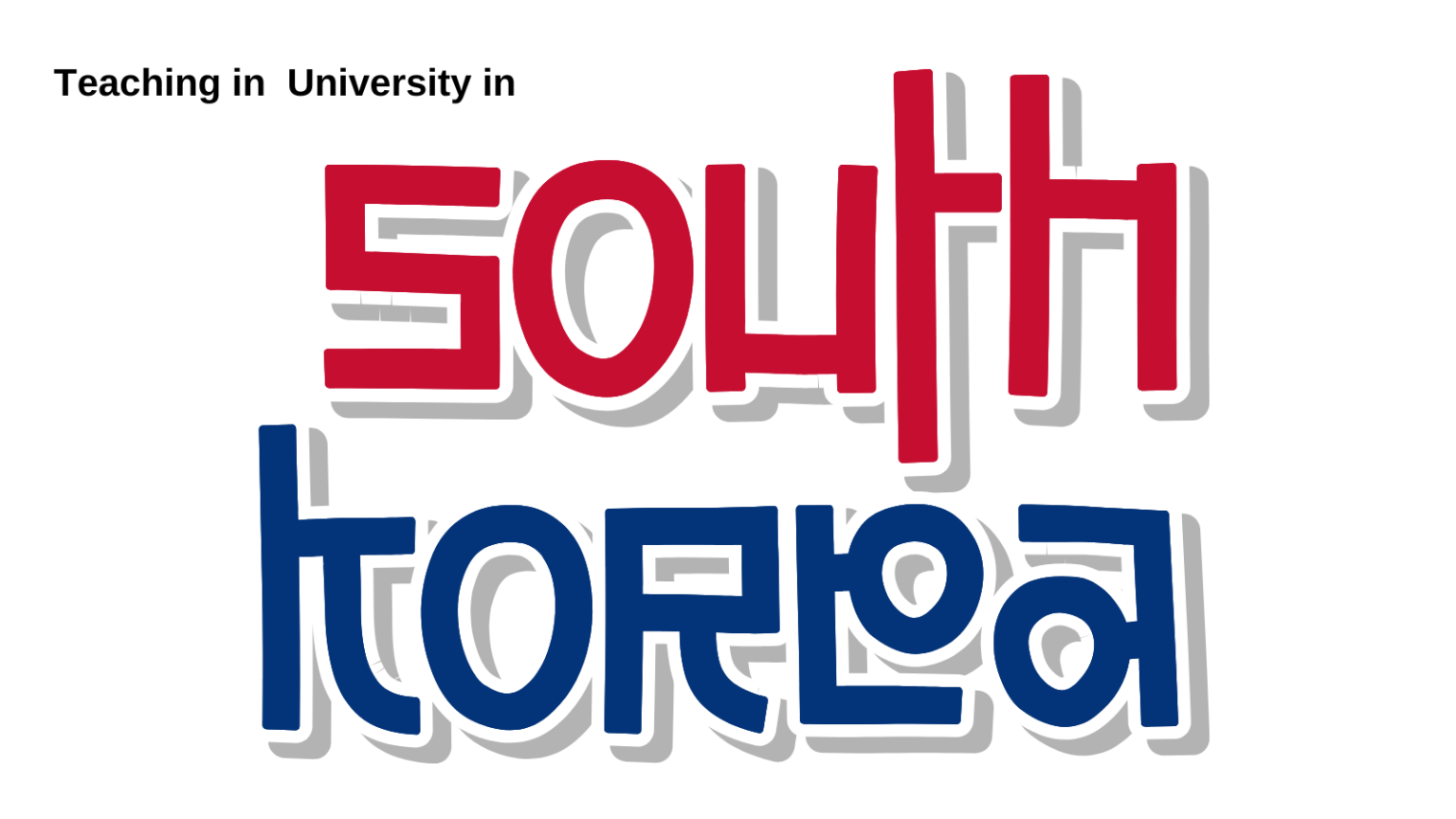Teaching in Korean Universities
As I end my 20th year in Korea, and my 18th as a Professor at a University in Seoul, I have been reflecting on what life is like for a present-day University instructor and trying to predict what is coming for those of us teaching in Korean universities.
1) The Job:
According to one blog for English teachers, salaries at Universities in Korea range from 2.3 to 3.5 million won per month (1)(1 US Dollar equals 1,162 Won as I write this). This sounds about right, although I regularly check jobs ads to see what the conditions are like both inside and outside of cities like Seoul or Busan and there are jobs being advertised with salaries ranging from 1.8 up to a high of 4 million.
Working conditions include anywhere from 9 to 18 contact hours per week, plus up to 4 hours of office hours, faculty meetings, and other duties which may be paid but probably are not (2). Overtime is available at most universities, but pay may range from as low as 15,000 up to 45,000 Won an hour. Some universities will require that you work summer or winter classes or camps between terms but most pay extra for this and – with at total of at least 8 weeks of vacation in July/August and January/February, instructors still get 2-4 weeks of vacation afterward.
Most available jobs are for Freshmen or Sophomore classes and conversation is still the typical focus of most classes although other skills like Writing, Presentations, Job Skills, and Debate are slowly taking the place of the basic conversation classes that used to be the mainstay of Universities all across the country. Other benefits include between 8 to 16 weeks of vacation a year, on campus housing or a small housing subsidy between 300,000 to 600,000 won per month, 50% of health care and pension costs and one way or return airfare. In brief, the Canadian Government website has this to say about teaching English at a University in Korea, “Most universities in Korea employ full-time English conversation instructors. University classes tend to be large and feature less personal contact with the students. Most instructors teach between 10 and 15 hours a week.” (3)
2) The Students:
According to an article from the Korea Herald, classes of 100 or more at a top ranked University in Seoul were far fewer than those of 20 or fewer(4). In the 90’s, classes of 35-50 were fairly common at many universities both inside and outside of Seoul but those numbers have dropped to 25 or so on average for Freshmen or Sophomore English classes. However, numbers may not be as notable as as the diversity in today’s university or college classes in Korea.
According to the Study in Korea website, “…the statistics on foreign students in Korea, there were 91,332 foreign students studying as of April 1, 2015. By country of origin, foreign students were from 171 countries. By area of study, there were 22,718 Korean language students, 32,972 undergraduate students, graduate students 22,767 and 13,415 other students.”(5) Many colleges and Universities are under pressure to alleviate the anticipated effects of the declining birth rate which will result in a surplus of slots for University students by 2018 and as many as 160,000 empty seats by 2023 and one solution is to attract as many as 200,000 international students(6). Some universities are even building special dormitories exclusively for international students or planning to put them all in special classes or departments(15). As a University instructor or Professor, this means all the advantages and disadvantages of a more diverse classroom are to be expected.
3) The Power of ‘English’:
According to the Diplomat, “Koreans spend $17 billion a year and have hired 30,000 native English speakers to meet the demands of concerned parents who want their children to match the expectations of the job market.”(7) According to a study reported in the Korea Times, most of these expenses are related to private education (like private English classes and test-prep courses) since most Koreans do not trust public education (8) This suggests that public education has a much harder time convincing parents that it is succeeding while at the same time mainly preparing students for the dreaded college entrance exams. As an article in Groove Magazine put it, “Parents want the best for their kids, and for Kim, learning English is the “bridge” to success. Some students are driven to study English to experience the world, while others just hope their high English scores will help them get into a famous university and land a job at one of Korea’s big-name chaebol companies.” (10)
As Professor Kim Tae Young said, “The current college entrance exam does not test speaking and writing skills, which are crucial for Koreans to disseminate their creative ideas to the world through the Internet and other high-tech means ”.(9) The proposed solutions have been many, including changing the College entrance exam to include speaking and writing but “…those ideas have often petered out amid controversy over their administrative implementation and technical viabilities(sic), and public concerns that they would hinder efforts to curb the bloated private education market.”(9) This means that universities will continue to struggle to make up for the shortfalls of the public education system with classes filled with both highly fluent students who have had private classes and may have spent time overseas and students who relied primarily on their K-12 English classes to develop their English abilities. Therefore, classes with multiple levels and varying degrees of interest in anything related to English are to be expected at many Korean Universities.
4) English Exams EVERYWHERE.
G-TELP IELTS, NEAT, OPIC, PELT, PTE, TOEIC, TOEFL, TEPS and the list keeps growing. Each of these acronyms represents an English test that was developed either in Korea, the US or the UK/Australia to evaluate the proficiency of non-native English speaking students for work or study purposes. According to Groove Magazine, “Samsung Economic Research Institute estimated that Koreans, who make up nearly 1 in 5 TOEFL test takers worldwide, spent a total of 14.3 trillion won ($13.1 billion) a year on private English tutoring, and another 700 billion won a year applying for English proficiency tests in 2005.”(10) That is a huge market and publishers, instructors and universities are eager collect their share through textbooks, classes with test names in their titles (especially TOEIC as many universities require their graduates to get a certain TOEIC score to graduate), and some colleges or universities even become official test centers for these exams as well. This may mean that your classes will be more focused on test preparation rather than conversation, presentations skills or writing, for example.
5) Qualifications and their value here:
Unlike a few years ago, the basic qualification to be an EFL Professor is now a Master’s in Education, TESL or Linguistics in the majority of cases. While you can get a job with a BA and 5 years of university experience, most job ads require a completed Master’s degree in one of the aforementioned disciplines and 2 years of university experience. Although a TESL certificate is now apparently a requirement for K-12 teachers, university jobs most often do not require any qualifications other than a Master’s degree. Some Universities are even asking for a Ph.D but, at least in ELT, the difference in hours (9 rather than 12-15) and pay (often 1-2 hundred thousand won per month)(2) will be offset by other duties like committee work, advising graduate students or attending faculty meetings conducted mostly in Korean, for example.
6) Is it a long term or a short term job?
In early 1996, the ELT field in Korea seemed to be booming. Jobs were plentiful and the won was strong but then the economy crashed and many teachers fled as their salaries (paid in won) crashed. After the IMF period ended, the economy seemed to stabilise and the demand for English teachers has continued. Programs like the English Program in Korea (EPIK) established in 1995 and Teach and Learn in Korea (TaLK) established in 2008 have placed over 5000 teachers in public schools all over Korea. But these programs’ rise and fall based on the priorities of the current government and have rarely met their stated goals for recruitment. As a university or college instructor, this means that the levels and abilities of incoming students can be quite inconsistent.
Noonchi (Nunchi) Primer for Teachers in Korea
The death of the National English Aptitude Test (NEAT) (11) has done a number of things that make the future of English Education less promising.
First, the continuation of the traditional college entrance exam means that speaking and writing will continue to be less important that reading, grammar and other English skills.
Second, in conjunction with the cuts in EPIK teachers in Seoul, for example, the apparent gains in English ability over the past few decades will be lost(12).
Third, this seems to contradict the current government’s claim that they ended the NEAT as a College entrance requirement to reduce the burden of Korean Families to pay for private lessons (11). On the other hand, the pool of E2 visa holders has dropped over the last few years which – coupled with the changes in requirements for newly hired college or university instructors mentioned above – means that the competition for university jobs is likely to decline as time goes by if the trends continue as they are. (12) Based on the above as well as the fact that English policies tend to change with every government and change in Education policy, I expect that these trends will reverse when a new government takes over (see (12) for a brief overview of Korea’s Education system). Third, the age of the generalist is ending. Being a native speaker who can only teach conversation or language skills is no longer enough.
While I think a Doctorate is overkill where language teaching at a university is concerned, it will open doors to tenure track positions in other departments and fields than TESL/TEFL. The age of the specialist is approaching and so it is a good idea to diversify your skills while offering unmatchable skills in one or two areas like debating, job skills, drama, or academic writing to tip the scale in your favour when applying for a university or college job. Korea still offers a lot of opportunities for those who want both a brief interlude between graduating from college and starting their career back home or trying to start a career in ELT at the college or university level.
As one article from Times Higher Education stated based on research studies about foreign academics experiences at a well known and highly ranked University in Seoul showed, many are not staying for more than a few years (14). At the moment, the former will probably be more satisfied than the later in my opinion but wait a few years when a new government starts reforming education and English education will probably become a true priority once again.
(1) http://www.gooverseas.com/blog/teaching-english-in-korea-salary
(2)
(3) http://travel.gc.ca/travelling/publications/teaching-english-in-korea
(4) http://www.koreaherald.com/view.php?ud=20140519001358
(5) http://www.studyinkorea.go.kr/en/sub/overseas_info/korea_edu/edu_student.do
(6) http://monitor.icef.com/2015/10/korea-aims-for-200000-foreign-students-by-2023/
(7) http://thediplomat.com/2014/10/english-education-in-korea-unrealistic-expectations/
(8) http://www.koreatimes.co.kr/www/news/nation/2012/08/202_112506.html
(9) http://www.koreaherald.com/view.php?ud=20140205001245
(10)
(11) http://www.koreatimes.co.kr/www/news/special/2015/10/181_157589.html
(12) http://www.asiapundits.com/korea-cuts-2500-native-english-teachers-public-schools/
(13) http://www.koreaherald.com/view.php?ud=20150816000348
(14) https://www.timeshighereducation.com/news/foreign-academics-in-korea-disempowered-and-ready-to-leave
[/jbox]








2 Responses
Peter Nelson
Hi Tory, Pete Nelson here, now living in Olympia, Washington State(about four hours south of Vancouver, BC). Great to read your article, and I hope you, your family and the KOTESOL 'family' are all well. Hopefully we can keep in touch! Pete
24/04/2016
Tory Thorkelson
Pete; Great to hear from you! I am glad things are going well for you. I often get through Vancouver as many of my relatives are there, Hopefully, we can coordinate and catch up one of these days. All the best and keep in touch! Tory
26/04/2016